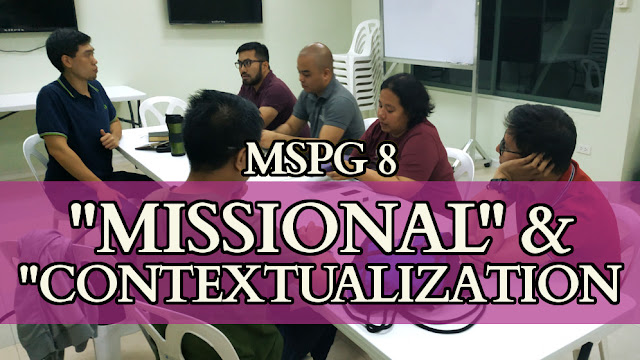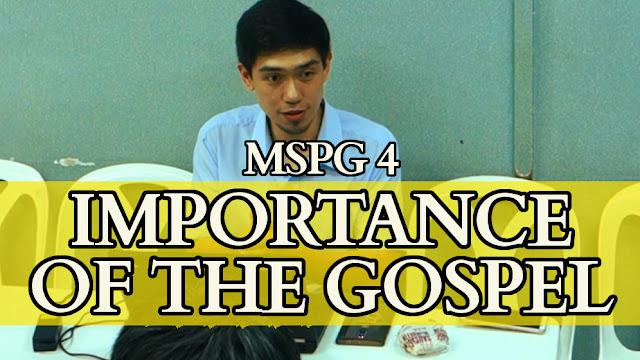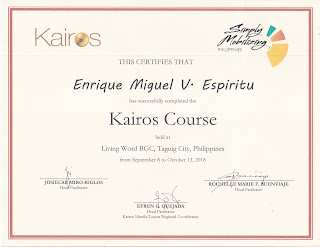MSPG 8 - "Missional" and "Contextualization"
I don't pretend to be a missions expert, but the church has to start somewhere. The Lord has been teaching me more and more about missions since 2015, and I've spent a lot of time in the last two years exploring this important aspect of the church's life.
Since Elynne and I are planning to migrate soon to study at TMS, I don't have much time to share what I've been learning with others. So in the next five months, January to May, I'm holding a weekly "Missions Study & Prayer Group" (MSPG) to equip them to help in the church's developing missions program.

“Missional” and “contextualization” are common terminology in evangelical discussions on missions. Many conservatives dislike the terms. However, others argue that they are very useful. Let’s take a look at these two words and see for ourselves.
“MISSIONAL”
One of, if not the first appearance of the word “missional” was in the book God Who Sends (1983) by Francis Dubose. But since then, it has taken on a wide variety of meanings and connotations. Those who are most attached to the term seem to lean more toward the progressive side of evangelicalism that emphasizes social justice and similar issues. That being said, it doesn’t mean that we need to dismiss missional thinking off-hand.(DeYoung-Gilbert, 23-24) “At their best, missional thinkers are warning the church against a careless, loveless indifference to the problems and potential opportunities all around us, a dualistic disregard for the whole person.”
BAD EXAMPLES
Here are some problems with what is sometimes referred to as “missional”. First, biblical texts are misused.(DeYoung-Gilbert) “In missional thinking, Genesis 12 is more than a promise. It’s more than a revelation of God’s ultimate mission in redemptive history. It is a command for the children of Abraham to help the nations experience all the good gifts that God longs for them to enjoy.”Second, good behaviors are commended, but in the wrong categories.
(DeYoung-Gilbert, 21) “For example, many good deeds are promoted under the term social justice, when we think “loving your neighbor” is often a better category. Or, folks will talk about transforming the world, when we think “faithful presence” is a better way to describe what we are trying to do and actually can do in the world.”Third, we put hard “oughts” on Christians when there should be inviting “cans” – Christians are not obligated to be involved in every issue they possibly can (ex. Human trafficking, AIDS, education, etc.)
Finally, making disciples is marginalized in exchange for a passion for renewing the city or tackling social problems.
(DeYoung-Gilbert, 22-23) “We want to make sure the gospel—the good news of Christ’s death for sin and subsequent resurrection—is of first importance in our churches. ... We want the crystal-clear and utterly unique task of the church—making disciples of Jesus Christ to the glory of God the Father—put front and center, not lost in a flurry of commendable concerns. ... We want the church to remember that there is something worse than death and something better than human flourishing. If we hope only for renewed cities and restored bodies in this life, we are of all people most to be pitied.”
CONSIDERING THE TERM
We must understand that there is no, one definition of “missional”.(Stetzer) “People use the words mission, missions, and missional in different ways. Thus, any discussion of missional cannot be complete without asking the question, "which missional?"”
(DeYoung-Gilbert, 20) “More and more, missional simply means being “on mission”—conscious of how everything we do should serve the mission of the church, being winsome and other-centered and Good Samaritan–like with those outside the community of faith, and having a sanctified strategy of being intentional and “attractional” for those who don’t know Christ. It is often shorthand for “get out of your holy huddle and go engage your community with the gospel.” We are all for that. Every Christian should be.”
THE "MISSIONAL" CHRISTIAN: A NEW ELITE?
Missiological circles talk about “World Christians” as distinct from “ordinary” or “nominal” Christians. This is the equivalent of a ‘missional Christian’.(Kairos, 8-3) “World Christians are ordinary believers whose lives have been transformed by an extraordinary vision. … They see the world as God sees it. They are thrilled at what God has done and is doing to establish His kingdom, and they fervently desire to be a part of that kingdom program, however small.”
(Hickman-Hawthorne-Ahrend) “World Christians pursue God’s purpose as the focal point of their entire life. They aren’t superior to other believers. They’ve simply decided to allow every decision of their lives to be directed by the magnetic pull of God’s purpose.”Is this a healthy way of talking about Christian obedience and purpose?
“CONTEXTUALIZATION”
Sources- Samuel Williams, “Contextualization in Indian Missions and Its Impact on Scriptural Authority,” in Mark Tatlock (ed.), The Implications of Inerrancy for the Global Church, 77-87.
- Kairos, 4th ed.
WHAT IS "CONTEXTUALIZATION"?
Contextualization can be defined as “the adaptation of Scriptural truth to an audience-specific culture and people” and “has become a normative assumption in ministry today” (Williams, 77).(Keller, Center Church, 93) “As soon as you express the gospel, you are unavoidably doing it in a way that is more understandable and accessible for people in some cultures and less so for others.”The word itself emerged from the liberal missiology of the World Council of Churches (WCC). The WCC’s Committee on World Evangelism and Missions convened a conference in 1972, where Shoki Coe, the General Director of the Theological Education Fund, a WCC agency, was credited with inventing this term. Their discussion of contextualization focused on how theology should adapt to indigenous cultures.
DEFENSE OF CONTEXTUALIZATION
One of the factors that makes contextualization so attractive is the seeming ineffectiveness of ‘traditional,’ ‘western’ preaching. Though the New Testament clearly presents preaching as one of the most important tools of missions, and even though we are told that preaching must present the objective truths of Scripture (2 Tim. 4:2),(Williams 85) “These mindsets were in contradistinction to the Asian patterns of teaching that preferred narrative formats and informal argumentation. In addition, missionaries preaching in the Indian context with orthodox, biblical forms seemingly generated a lack of interest from a Hindu audience and their ministries showed little visible fruit.”Of course, this is just pragmatism.
One of the common defenses of such integration is Paul’s use of Epimenides (a poet from Crete) and Aratus (A Macedonian poet) in his evangelistic sermon to the Athenians in Acts 17. The two quotes are: "In Him we live and move and have our being," and "We also are his offspring" (Acts 17:28).
(Williams, 81) “As William Hendrickson explains, “By quoting these poets Paul is not intimating that he agrees with the pagan setting in which the citations flourished. Rather, he uses the words to lit his Christian teaching.” Paul does not preach Christ from these secular poets, but merely affirms with general revelation that God is our Creator. Christ and Him crucified can only truly be preached from the inspired Word of Christ (1 Cor. 1:23). Contextual integration of historical truth with pagan ideas inevitably erodes our view of the uniqueness of divine revelation.”
PROBLEMS OF CONTEXTUALIZATION
In Third-World countries like India and the Philippines, the idea of contextualization comes hand-in-hand with an anti-colonial mentality and the idea that “Asian” theology is distinct from “western” theology.Anti-colonial mentality is a reactionary stance against colonial mentality. Whereas colonial mentality saw all things “western” as being superior to “Asian” things, anti-colonial mentality swings the other way. It insists that Asians must behave and be treated according to an “Asian” culture and philosophy.
(John R. Davis) “[Western theologies] perpetuate a Western world-view, Western values and Western theological presuppositions… they unconsciously perpetuate an unacceptable theological imperialism.”This is, of course, very problematic.
- There is no such thing as an “Asian” theology that can be clearly distinguished from a “western” one, especially as globalization increases.
- It is alarmist. What is “theological imperialism” anyway, and why is it so bad?
- It is deterministic and condescending because it assumes that people cannot think for themselves. First, they are hapless victims of their cultures, and then they are hapless victims of ‘theological imperialists’.
- It overemphasizes cultural differences and minimizes our shared humanity.
- It fails to recognize the fact that what they call “western” theology was shaped by the Bible, which is an “eastern” book.
Here are some problems in Indian churches that Williams links with contextualization. First, systematic theology is rejected because it is supposedly a “western” way of thinking. Theology cannot be encapsulated in a creed, but must flow out of a direct experience with Christ.
Secondly, pagan beliefs are validated as ‘pre-Christian’, and this, they say, is humility.
(J.N. Farquhar, Scottish missionary to India) “If Christ is able to satisfy all the religious needs of the human heart, then all the elements of pagan religions, since they spring from these needs, will be found reproduced in perfect form, completely fulfilled, consummated in Christ.”
(Sadhu Sundhar Singh, famous Christian mystic and missionary) “Christianity is the fulfillment of Hinduism. Hinduism has been digging channels. Christ is the water to flow through these channels.”Indian evangelists use Hindu scriptures in their evangelism. For example, one popular evangelist, Sadhu Challapa, identified the Lord Jesus Christ with the Hindu Vedic deity, Prajapati. He preaches forgiveness of sin through Prajapati. (Williams, 80)
As a result, pagan beliefs are ‘off-limits’ to attack. Instead, preachers should study these beliefs to use the fragments of truth in them as aids in preaching the gospel.
(William, 85–86) “Indian preaching began to take on a form of its own, with nationals… expounding Indian poetry and religious philosophy, and de-emphasizing historic Christian teaching. Criticism of Hindu thought was avoided and the use of Hindu texts in the sermon was encouraged.”This is a pragmatic approach that is strikingly familiar to the seeker-sensitive movement in the US. The sufficiency of Scripture and the sovereignty of God in salvation are overlooked.
(Williams 86) “Contextualization with Indian philosophy made preaching weak in Scripture and overly emphatic on missions and relevance. … Evangelistic preaching has a vital function in the church (2 Tim. 4:5), but never at the expense of sermons that edify the saints (2 Tim. 4:2). In this model, preaching as a function of discipleship was eclipsed. This ultimately caused the weakening of Scripture’s voice in preaching and eventually led to the doctrinal weakening of the Indian Church.”
DISCUSSION: THE HOMOGENEOUS UNIT PRINCIPLE
One of the strategies proposed for use in frontier missions (reaching LRPs) is the Homogeneous Unit Principle (HUP).(Kairos, 5-11) "the cross-cultural workers [of previous times] were often satisfied when they had been able to lead several people to the Lord, often from varying backgrounds, and see them gathering together on a regular basis. It was halfway through the last century that Dr Donald McGavran began talking about people movements and the homogenous unit principle as defined by Dr Donald McGavran."Its goal is to maximize the natural relationships in a society by targeting specific ethnic groups individually and planting ethnic churches rather than "conglomerate" churches.
(McGavran1) "The goal of Christian mission should be to preach the gospel and by God's grace to plant in every unchurched segment of humankind, not one small sealed-off conglomerate congregation, but rather 'a cluster of growing congregations in every segment'.
"One single congregation is almost always a conglomerate church—made up of members of several different ethnic and social segments of society. ... It is sealed off from all the people groups of that region. No segment of the population says, 'That group of worshipers is us'. They are quite right. It is not. It is ethnically quite a different social unit."HUP is said to be applicable "only where Christianity is considered a foreign invading religion. In many societies, where the church has achieved a certain level of maturity and Christianity has gained an acceptable status, this principle would not be necessary."
McGavran outlines seven steps to applying HUP:
- Aim for a cluster of growing congregations – This ought to be the clear goal.
- Concentrate on One People – Designated either by caste, tribe, or social segment.
- Encourage converts to remain with their people – Converts are to make every effort to continue the customs and traditions of their people (ex, food, clothes, courtesy). They must, however, reject anything that would compromise their faith, and be willing to cheerfully bear any exclusion or presecution they may receive from their people.
- Encourage group decisions for Christ – Postpone baptism of the first convert to minimize ostracism. Wait until a group of converts can all be baptized at once and form a cohesive community of faith.
- Aim for a constant stream of new converts – "The principle requires that from the very beginning the missionary keeps on reaching out to new groups instead of becoming entrenched in a teaching role. A church dependent on missionary teaching soon becomes ingrown and sealed off from its own people."3
- Help converts exemplify the highest hopes of their people – They should feel that they are pioneers, modeling to their people a better way to live.
- Emphasize brotherhood – Not by attacking imperfect social institutions, but by teaching people from every segment of society to obey Christ.
DISCUSSION: AVOIDING WORDS WITH “BAGGAGE”
(Kairos, 5-13) "People movements are happening and are looking different in different places and countries, but all agree that the people need to be in churches, Kingdom communities, faith communities or Jesus fellowships. We will sometimes use the term 'community of Jesus followers' in place of church in a deliberate affort to make us more aware of the negative image many of the least reached have of the word 'church'. In Muslim cultures, and some Hindu cultures as well, using the words 'Christian' and 'church' should be avoided as much as possible because they often relate these words more to the Christian religion and Christian countries rather than communities of the followers of Jesus."


